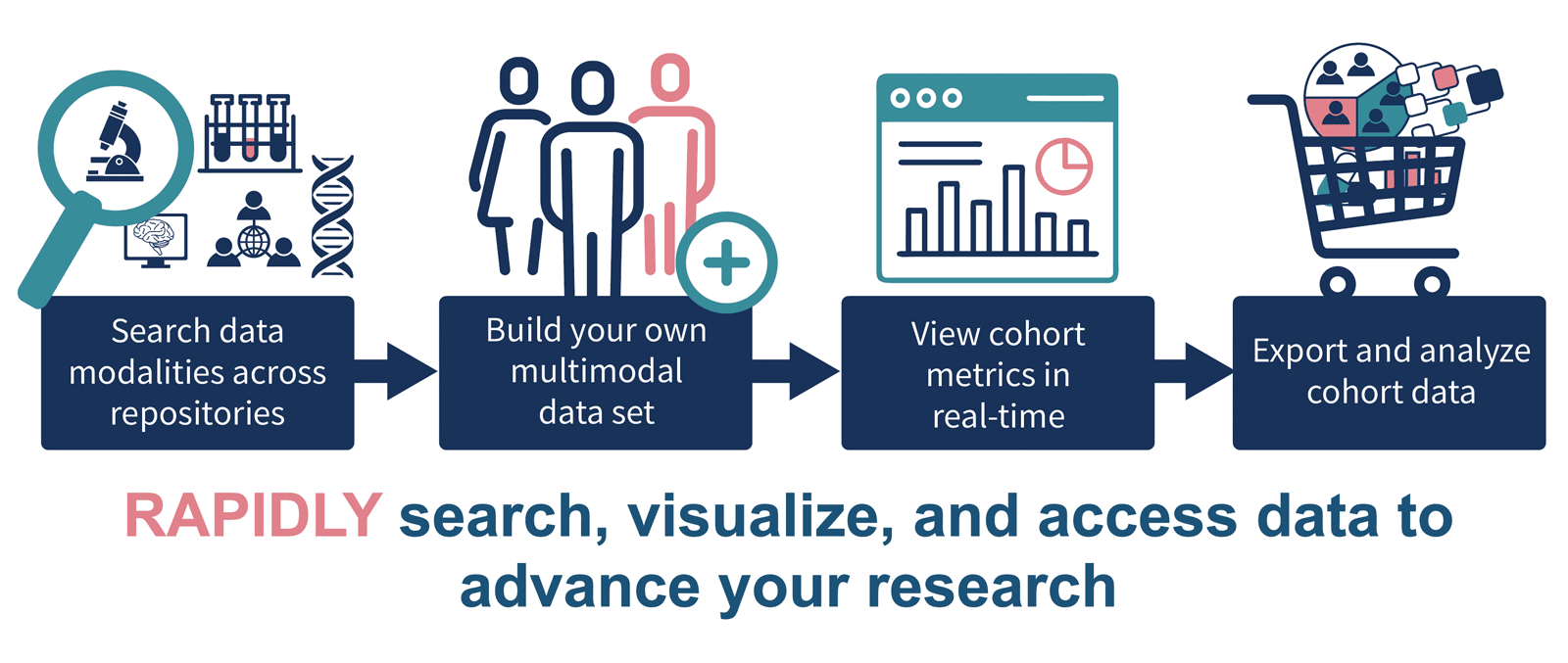Data Front Door
The NACC Data Front Door (DFD) empowers researchers to rapidly search, visualize, and access ADRC participant data across modalities and repositories to access the pace of discovery in AD/ADRD.
The DFD offers streamlined access to a growing volume and variety of standardized and harmonized multimodal data from over 54,000 participants. Key components of the DFD include our streamlined Quick Access File Data Request System (powered by REDCap), real-time dashboards, secure LINKAGE enclave, and our new multimodal query tool (MQT). The DFD is enabling researchers to ask and answer new questions and to tackle the most pressing challenges in the field, including through AI-driven discovery.

Learn more about the data modalities available via the DFD:
Quick Access File Data Request System (QAF-DRS)
Rapid access to NACC’s high-quality data. It takes just 15 minutes to sign a DUA and submit a request through our electronic system. Approved researchers will receive all data within 48 hours (not including weekends and holidays).
Real-time dashboards
Dynamic insights into data availability. The SCAN Public Dashboard provides researchers with up-to-date information on the volume of standardized MRI/PET data (SCAN-compliant) and analysis results that are available from across the ADRC Program.
LINKAGE Enclave
Approved researchers at pilot project partner sites can now access and perform analysis on integrated UDS, real-world data (EHR and claims), and genetic data (Genome-Wide Association Studies (GWAS), Whole Exome Sequencing (WES), Whole Genome Sequencing (WHS)) within a secure enclave.
Multimodal Query Tool (MQT)
What You Can Do with the Multimodal Query Tool (MQT)

The Multimodal Query Tool is a self-service tool designed to empower researchers to:
- Quickly assess data fit for a research question or proposed analysis by building and visualizing custom multimodal datasets in real time
- Easily search and access a large volume and variety of multimodal data on ADRC participants across major AD/ADRD repositories (e.g., NACC, NCRAD, NIAGADS, ADKP, LONI, and others)
- Monitor sample size and key characteristics of eligible participants as you refine your query criteria
- Download NACCIDs for your selected participants and use them to access additional data across NACC and partner repositories
- Generate a reproducible query record to cite in publications and support transparent, FAIR-aligned research
How to use the MQT V1
- Set your filters to define participant selection criteria.
- Run multiple queries as needed (e.g., for case/control groups).
- Download NACCIDs for participants who meet your criteria.
- Record your filters to create a reproducible selection record for manuscripts (your filters appear in the top right corner of the tool).
- Request full datasets through the Quick Access File Data Request System. You’ll need to sign a DUA to access data across multiple modalities.
- Use your statistical software to restrict the Quick Access File to your selected participants.
- Use your “shopping list” (NACCID list) to streamline access to additional data modalities from partner repositories (e.g., NCRAD, NIAGADS, ADKP, LONI).
About MQT V1 (Prototype)
MQT v1 is a prototype release currently undergoing validation and continued development. Minor discrepancies may exist between searchable data in MQT and the most recent Quick Access File (QAF). These will be resolved when the QAF is migrated to the new NACC Data Platform in Q4 2025. Questions? Contact us at nacchelp@uw.edu.
What's Coming Next for the MQT
We're actively building new features to expand the power and flexibility of the Multimodal Query Tool. Upcoming enhancements include:
- Expanded filtering options for additional data modalities—including those housed at partner repositories—such as expanded neuropathology data, fluid biomarker and genomic/genetic data availability and analysis results, and up-to-date biospecimen inventories.
- Time-based filtering, allowing researchers to refine queries based on intervals between events (e.g., time between a clinical visit, blood draw, and PET exam).
- Streamlined access workflows to simplify requesting and retrieving data from partner repositories linked to NACC.
Help Shape the Future of the MQT
Developed with input from dozens of ADRD researchers, this first release lays the foundation for a more powerful, user-driven discovery platform.

